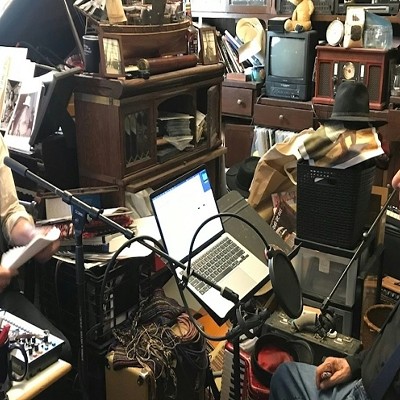Almost 100 rare publicity photos and other items that once belonged to Duke-Peacock Records were put online recently by the University of Houston’s digital library, offering an invaluable glimpse into the innermost workings of one of the most important U.S. record labels of the post-WWII years. Run by the brilliant but tyrannical mastermind Don Robey, Duke-Peacock may not be quite as well-known as Memphis’s Sun Records or Chicago's Chess Records, but many musicians, historians and record collectors believe it was just as significant.
Incredibly, these materials — even including an old Duke-Peacock business card — were left behind at the label's old offices in Fifth Ward, which shut down after Robey sold the Duke-Peacock catalog to ABC/Dunhill Records in 1973, not long before he died. They were discovered by Houston music historian Andrew Brown, according to UH Special Collections archivist Vince Lee. Brown donated his findings to UH in 2011.
“Apparently the building was abandoned, and he went looking through it and a lot of the documents and photographs were left on site after all the years,” says Lee. “He figured that these things needed to be preserved, because it's only going to deteriorate over time.”
The collection includes several performance and publicity photos of some of Duke-Peacock’s top artists, legends like Clarence “Gatemouth” Brown and Bobby “Blue” Bland as well as gospel groups the Bells of Joy, Blind Boys of Mississippi and Sensational Nightingales. (Robey was arguably as successful a gospel mogul as he was rhythm and blues.) Also here are many of the top blues and R&B stars of the 1950s and ‘60s, names that are still familiar today: Johnny Ace, Lloyd Price, O.V. Wright, Otis Rush and Junior Parker, among others. Several other photos show a young B.B. King, who never recorded for Duke-Peacock but was a client of the Robey-owned Buffalo Booking Agency. Texas music aficionados will also recognize Duke-Peacock bandleader/arranger Joe Scott, Dallas rockabilly great Ronnie Dawson and longtime Houston mainstays Big Walter “The Thunderbird” Price and Texas Johnny Brown. Many others whose names and music have been largely lost to history — Buddy Moody, Doodle Owens, the Sultans, Tammi Starr — are in the collection as well.
“This was before Motown and Berry Gordy, and Houston very much had its own sound and stable of artists that have come out of here that influenced blues and rock and roll and some of the other genres going forward,” Lee says.
Also included are a handful of log books from the Houston-based Audio Company of America. Long before computers, every track from a recording session had to be entered into one of these volumes, which Lee says contain intricate details about the recording process — making them invaluable to musicologists and other researchers interested in music history.
“One of them looks almost like a ledger of sorts,” he explains. “You fold it out and there are graphs and lines, and each section or each line indicates the title of the track, the artist, the format it was recorded on. Each of the sessions have a number that was unique to that track.”
The Duke-Peacock/ACA archive belongs to the Texas Music Collection, part of the library’s Houston & Texas History division. (Houston hip-hop has a division of its own, owing largely to the voluminous DJ Screw collection.) Lee notes the TMC has a host of other music-related materials in a variety of genres, mostly from 1940 through the late ‘60s, but the Duke-Peacock collection is the first to be scanned into the library’s digital archives.
“This was more of the low-hanging fruit, if you will,” he says.
Browse through the entire collection here.
UH’s Special Collections Reading Room is open to the public from 9 a.m. to 5 p.m. Monday through Friday and 12 to 4 p.m. Saturday at the M.D. Anderson Library, second floor. See here for more information.
Support Us
Houston's independent source of
local news and culture
account
- Welcome,
Insider - Login
- My Account
- My Newsletters
- Contribute
- Contact Us
- Sign out
[
{
"name": "Related Stories / Support Us Combo",
"component": "11591218",
"insertPoint": "4",
"requiredCountToDisplay": "4"
},{
"name": "Air - Billboard - Inline Content",
"component": "11591214",
"insertPoint": "2/3",
"requiredCountToDisplay": "7"
},{
"name": "R1 - Beta - Mobile Only",
"component": "12287027",
"insertPoint": "8",
"requiredCountToDisplay": "8"
},{
"name": "Air - MediumRectangle - Inline Content - Mobile Display Size 2",
"component": "11591215",
"insertPoint": "12",
"requiredCountToDisplay": "12"
},{
"name": "Air - MediumRectangle - Inline Content - Mobile Display Size 2",
"component": "11591215",
"insertPoint": "4th",
"startingPoint": "16",
"requiredCountToDisplay": "12"
}
,{
"name": "RevContent - In Article",
"component": "12527128",
"insertPoint": "3/5",
"requiredCountToDisplay": "5"
}
]
KEEP THE HOUSTON PRESS FREE...
Since we started the Houston Press, it has been defined as the free, independent voice of Houston, and we'd like to keep it that way. With local media under siege, it's more important than ever for us to rally support behind funding our local journalism. You can help by participating in our "I Support" program, allowing us to keep offering readers access to our incisive coverage of local news, food and culture with no paywalls.
Chris Gray has been Music Editor for the Houston Press since 2008. He is the proud father of a Beatles-loving toddler named Oliver.
Contact:
Chris Gray
Trending Music
- The Rolling Stones At NRG Stadium Was One Great Party Last Night
- Houston Concert Watch 5/1: Satriani and Vai, Interpol and More
- Top 10 Butt-Rock Bands of All Time
-
Sponsored Content From: [%sponsoredBy%]
[%title%]

Don't Miss Out
SIGN UP for the latest
Music
news, free stuff and more!
Become a member to support the independent voice of Houston
and help keep the future of the Houston Press FREE
Use of this website constitutes acceptance of our
terms of use,
our cookies policy, and our
privacy policy
The Houston Press may earn a portion of sales from products & services purchased through links on our site from our
affiliate partners.
©2024
Houston Press, LP. All rights reserved.





